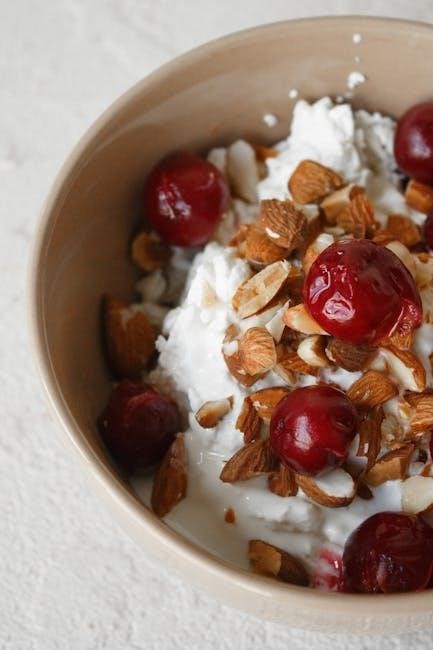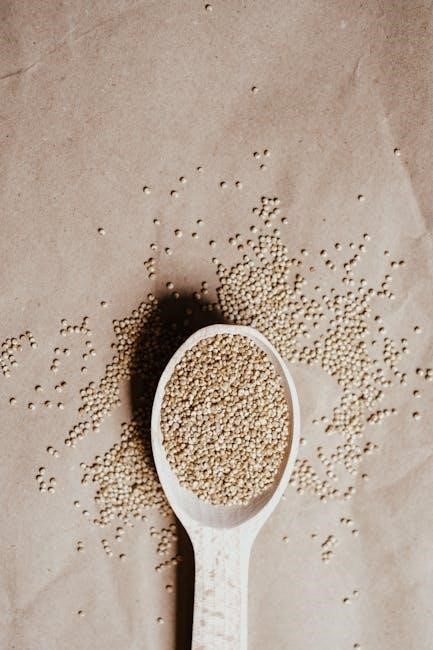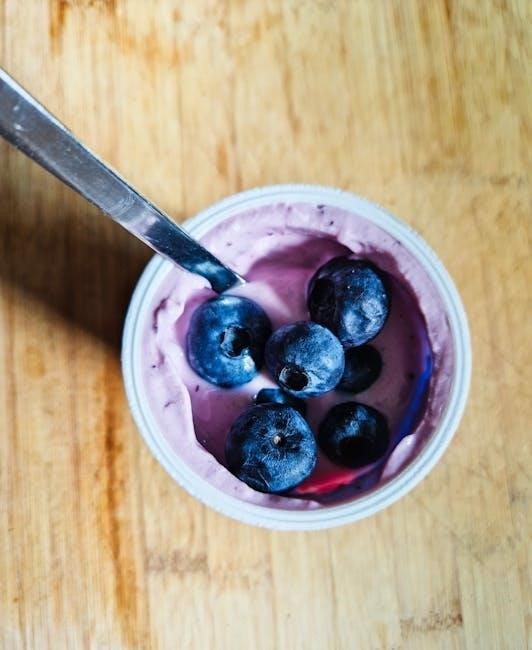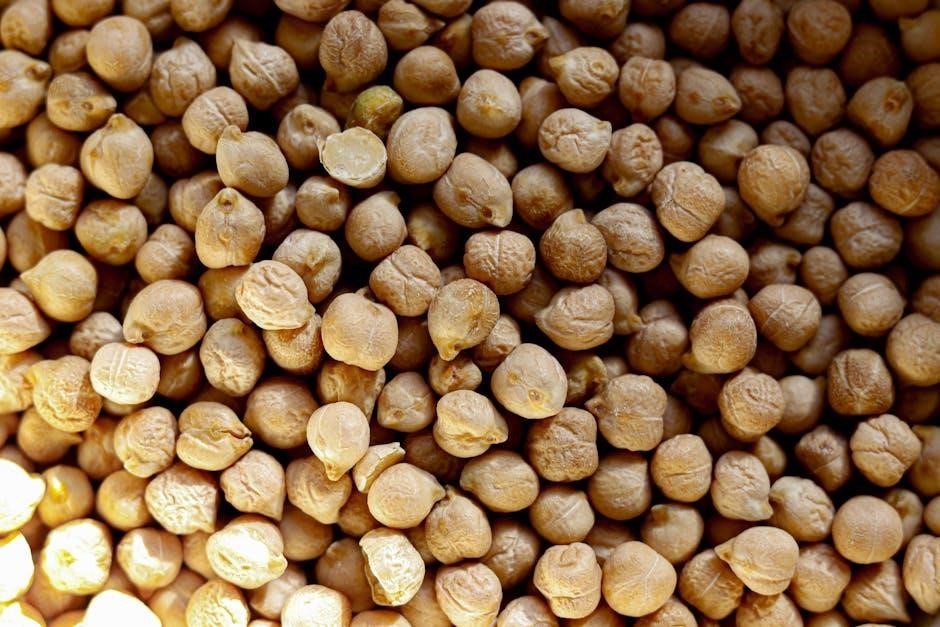Welcome to our guide on low-fat diets! This article explores the benefits, food options, and meal planning tips for adopting a healthier lifestyle. Discover how reducing fat intake can improve your overall well-being while enjoying delicious and nutritious meals.
Overview
A low-fat diet focuses on reducing fat intake, particularly saturated and trans fats, to promote health benefits. It emphasizes whole, nutrient-rich foods like fruits, vegetables, whole grains, lean proteins, and low-fat dairy. This dietary approach supports weight management, heart health, and digestion. By choosing low-fat options, individuals can create balanced meals that are satisfying and nutritious, helping to maintain overall well-being and reduce the risk of chronic diseases.
Importance
A low-fat diet is crucial for maintaining overall health and preventing chronic diseases. By reducing fat intake, it helps lower cholesterol levels, improve heart health, and manage weight effectively. This dietary approach also supports better digestion and reduces the risk of conditions like diabetes and certain cancers. Incorporating low-fat foods ensures a balanced nutrient intake, promoting long-term well-being and reducing the likelihood of health complications associated with high fat consumption.

Benefits of a Low-Fat Diet
A low-fat diet promotes weight management, improves heart health, and enhances digestion. It helps lower cholesterol, reduces chronic disease risks, and supports overall well-being while maintaining minimal fat intake.
Weight Management
A low-fat diet aids in weight management by reducing calorie intake, as fats are calorie-dense. Focus on nutrient-rich foods like fruits, vegetables, and whole grains to stay satisfied. Incorporating fiber-rich options helps control hunger, while lean proteins support muscle retention. Balanced meals with minimal fat promote sustainable weight loss and improved body composition without sacrificing flavor or nutrition.
Heart Health
A low-fat diet significantly benefits heart health by reducing the intake of saturated and trans fats, which can raise cholesterol levels. Incorporating vegetables, fruits, and whole grains helps lower blood pressure and improve circulation. Lean proteins and low-fat dairy further support cardiovascular well-being by maintaining healthy cholesterol levels and providing essential nutrients. This dietary approach minimizes the risk of heart disease, promoting a stronger, healthier heart;
Digestive Health

A low-fat diet supports digestive health by reducing the strain on the digestive system. Foods high in fiber, such as vegetables and whole grains, promote regular bowel movements and prevent bloating. Low-fat options like spinach, broccoli, and oats are easy to digest and rich in nutrients. This dietary approach helps maintain a healthy gut, reducing the risk of digestive disorders and improving overall nutrient absorption for better well-being.
Vegetables in a Low-Fat Diet
Vegetables are a cornerstone of a low-fat diet, offering high nutrient and fiber content while supporting digestion and overall health. They are naturally low in fat, making them ideal for a balanced diet.
A low-fat diet offers numerous health benefits, including supporting weight management, improving heart health, and enhancing digestion. By reducing fat intake, it helps lower cholesterol levels and reduces the risk of heart disease. Additionally, it promotes a feeling of fullness and boosts metabolism, aiding in weight loss. Incorporating low-fat foods can also improve digestion and prevent conditions like bloating and indigestion, making it a holistic approach to better overall well-being and long-term health.
Low-fat diets emphasize whole, nutrient-rich foods. Vegetables like spinach, broccoli, and carrots are excellent choices due to their minimal fat content. Fruits such as apples, berries, and oranges are naturally low in fat and high in fiber. Whole grains like oats, quinoa, and brown rice provide sustained energy without excess fat. Lean proteins, such as chicken breast, fish, and tofu, are ideal for maintaining muscle mass while keeping fat intake low. Incorporating these foods ensures a balanced and nutritious diet.
Fruits in a Low-Fat Diet
Fruits are naturally low in fat, making them an excellent choice for a healthy diet. They provide essential vitamins, minerals, and antioxidants, supporting overall well-being and digestion. Incorporating fruits like apples, berries, and citrus varieties helps satisfy sweet cravings while maintaining a balanced, low-fat lifestyle.
A low-fat diet offers numerous health benefits, including weight management, improved heart health, and reduced risk of chronic diseases. It helps lower cholesterol and triglycerides, promoting better cardiovascular function. A low-fat diet can also aid in managing conditions like fatty liver disease and improving digestion. By focusing on nutrient-rich foods, it supports overall well-being while reducing the risk of obesity and related health issues. This approach provides a balanced and sustainable way to maintain long-term health goals.
Specific Examples
Some excellent low-fat food options include leafy greens like spinach and broccoli, fruits such as apples and berries, and whole grains like oats and quinoa. Lean proteins like chicken breast, turkey, and fish are ideal, while low-fat dairy products like yogurt and cottage cheese provide essential nutrients. These foods are not only nutritious but also help maintain a balanced diet, supporting overall health and weight management effectively.
Whole Grains and Their Role
Whole grains like brown rice, quinoa, and oats are rich in fiber and nutrients, providing sustained energy without excess fat. They support a balanced and healthy diet.
A low-fat diet offers numerous health benefits, including weight management, improved heart health, and enhanced digestive function. It reduces the risk of chronic diseases like heart disease and type 2 diabetes. By focusing on nutrient-dense foods, it supports healthy cholesterol levels and provides essential vitamins and minerals. This dietary approach promotes a balanced intake of fats, ensuring overall well-being while minimizing the risk of obesity and related health issues.
Examples of low-fat foods include vegetables like spinach, kale, and broccoli, which are rich in nutrients. Fruits such as apples, strawberries, and oranges are also excellent choices. Whole grains like quinoa and brown rice provide sustained energy. Lean proteins such as chicken breast and fish like shrimp are ideal for meals. Additionally, low-fat dairy products like skim milk and yogurt offer essential calcium and protein without excessive fat.

Lean Proteins and Their Importance
Lean proteins like chicken breast and fish are essential for muscle maintenance and overall health, offering high-quality nutrition while keeping fat intake low.

A low-fat diet offers numerous health benefits, including weight management, improved heart health, and enhanced digestive function. It reduces the risk of chronic diseases like obesity and diabetes. By focusing on nutrient-dense foods, this diet supports sustained energy levels and overall well-being. Incorporating low-fat options helps maintain a balanced intake of essential nutrients while minimizing unhealthy fat consumption, promoting a healthier lifestyle.
A low-fat diet includes a variety of nutritious options. Vegetables like spinach, kale, and broccoli are excellent choices. Fruits such as apples, berries, and citrus provide natural sweetness. Whole grains like oats, quinoa, and brown rice offer sustained energy. Lean proteins, including chicken breast, turkey, and fish, support muscle health. Low-fat dairy products like skim milk, yogurt, and cottage cheese are also great options. These foods ensure a balanced and satisfying diet.
Low-Fat Dairy Products
Low-fat dairy options are essential for a balanced diet, offering calcium and protein without excess fat. Choose skim milk, nonfat yogurt, and reduced-fat cheeses to support heart health.

Benefits
A low-fat diet offers numerous health benefits, including weight management, improved heart health, and enhanced digestion. It lowers cholesterol and triglycerides, reducing the risk of cardiovascular diseases. By focusing on nutrient-dense foods, it helps maintain energy levels and supports overall well-being. Additionally, a low-fat diet can reduce the risk of chronic conditions like diabetes and certain cancers, promoting a healthier lifestyle and longevity.
Examples
Low-fat diets emphasize whole, nutrient-rich foods. Vegetables like spinach, broccoli, and bell peppers are excellent choices. Fruits such as apples, berries, and citrus varieties are naturally low in fat. Whole grains like oats, quinoa, and brown rice provide sustained energy. Lean proteins, including chicken breast, turkey, and fish, are ideal. Low-fat dairy options like skim milk and yogurt, along with legumes, nuts, and seeds, round out a balanced diet. These foods promote health without excess fat.

Snacks and Beverages
Air-popped popcorn and veggie sticks with hummus make great low-fat snacks. Choose fresh fruits or a small handful of nuts for a quick, healthy option.
Water, herbal teas, and unsweetened almond milk are excellent low-fat beverage options. Avoid sugary drinks and opt for green tea or black coffee for added benefits.
Snack Options
For healthy snacking, opt for air-popped popcorn, veggie sticks with hummus, or fresh fruits like apples and berries. Rice cakes, baby carrots, and non-fat yogurt are also excellent choices. These snacks are nutrient-rich, low in calories, and satisfy cravings without excess fat. Avoid high-fat options like chips or pastries. Instead, choose portion-controlled snacks to maintain a balanced diet and support your overall health goals.
Beverage Choices
Opt for water, green tea, or black coffee as hydrating, low-calorie options. Unsweetened almond or soy milk are great non-dairy choices. Avoid sugary drinks and alcohol, as they can hinder weight management and health goals. Staying hydrated helps control hunger and boosts metabolism, supporting your low-fat diet journey for better overall well-being and weight loss.

Meal Planning and Grocery Tips
Plan meals around low-fat foods like fruits, vegetables, and lean proteins. Shop for whole grains, herbs, and spices to enhance flavor without added fats. Read labels carefully to ensure choices align with your dietary goals for a balanced and nutritious lifestyle.
Tips
- Plan meals weekly to avoid unhealthy choices.
- Read food labels to ensure low-fat options.
- Incorporate a variety of fruits, vegetables, and lean proteins for balance.
- Prioritize whole, unprocessed foods.
- Use herbs and spices for flavor instead of fats.
- Consult a nutritionist for personalized advice.
These strategies help maintain a nutritious and satisfying low-fat diet.
Grocery Shopping
Plan your grocery list to focus on low-fat essentials like fruits, vegetables, lean proteins, and whole grains. Shop the perimeter of the store for fresh produce, low-fat dairy, and lean meats; Avoid processed and high-fat snack aisles. Read nutrition labels to ensure products meet your low-fat goals. Stock up on pantry staples like oats, quinoa, and brown rice for healthy meal bases. This approach helps maintain a balanced and nutritious low-fat diet.

Common Misconceptions
A common misconception is that all low-fat foods are inherently healthy, but many are highly processed and high in sugar or sodium. Another myth is that low-fat diets are restrictive or bland, but they can be flavorful with herbs, spices, and creative meal planning. Additionally, some believe that eliminating all fat is necessary, but essential fatty acids are crucial for health. Understanding these myths helps you make informed, balanced choices for a sustainable low-fat lifestyle.
Adopting a low-fat diet offers numerous health benefits, from weight management to improved heart health. By focusing on whole, nutrient-rich foods like fruits, vegetables, whole grains, and lean proteins, you can create balanced, satisfying meals. With proper planning, a low-fat diet is sustainable and enjoyable, helping you achieve long-term wellness without feeling deprived. Start your journey today and embrace a healthier lifestyle with the guidance of our comprehensive low-fat food list and practical tips!